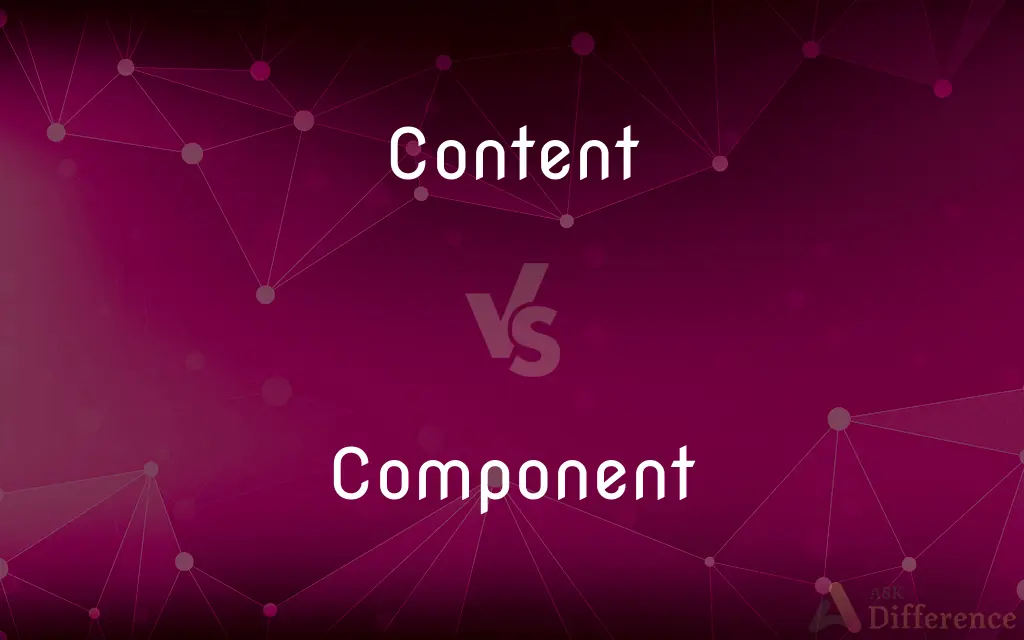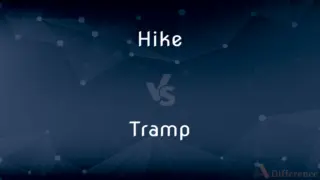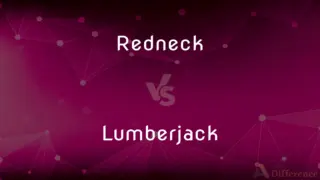Content vs. Component — What's the Difference?
Edited by Tayyaba Rehman — By Fiza Rafique — Updated on March 29, 2024
Content refers to the information or material within a medium, while a component is a part or element of a larger system or object.

Difference Between Content and Component
Table of Contents
ADVERTISEMENT
Key Differences
Content encompasses the substantive material within various mediums, such as text, images, and videos on a website, or the narrative and informational elements within a book or article. It's what users consume or interact with, providing value and meaning to the medium. Components, however, are the building blocks that constitute the structure of something larger, whether it's a part of a software application, a piece of machinery, or an element of a complex process. Components can be physical or abstract but are essential in the assembly or function of the whole system.
In the context of digital media, content is what fills the website or application, including text, graphics, and multimedia. It's the substance that viewers engage with, and it drives user experience by offering information, entertainment, or functionality. In contrast, components in this domain could refer to the widgets, buttons, and layout structures that form the website or app's interface, playing a crucial role in how the content is presented and interacted with.
In manufacturing or engineering, the distinction becomes more tangible. Content might refer to the information needed for the creation of a product, such as specifications, designs, and instructions. Components are the physical parts that are assembled to create the final product, such as the engine, wheels, and frame of a car. Each component is a necessary piece that, when put together correctly, allows the product to function as intended.
The development of any complex system, whether it's a software application, a mechanical device, or a piece of content itself, requires careful consideration of both its components and its content. Components must be designed, selected, and assembled to support the system's overall functionality and goals. Meanwhile, the content must be crafted to meet the needs and expectations of the end-user, providing value through information, utility, or entertainment.
While content and components serve different functions, they are both crucial to the success of products, systems, and media. Content is what delivers the message or value to the user, while components are what make the delivery of that content possible, whether through physical mechanisms in a device or through software and design elements in a digital medium.
ADVERTISEMENT
Comparison Chart
Definition
Information or material contained within a medium.
A part or element of a larger system.
Examples
Text, images, videos, articles.
Widgets, buttons, engine parts, software modules.
Role
Provides value and meaning; engages the audience.
Supports functionality and structure of the system.
Contexts
Digital media, literature, communication.
Engineering, software development, manufacturing.
Importance
Drives user experience and interaction.
Essential for assembly and operation of the system.
Compare with Definitions
Content
Substance of a website.
The website's content includes articles, videos, and infographics.
Component
Ingredient in a recipe.
Flour is a basic component in baking bread.
Content
Material in a book.
The book's content covers history and philosophy.
Component
Element in software.
User interface components enhance the app's usability.
Content
Media in advertising.
The advertising campaign used compelling content to attract customers.
Component
Factor in a system.
Trust is a key component of successful teamwork.
Content
Data in a presentation.
The presentation's content was engaging and informative.
Component
Part of a machine.
The engine is a crucial component of the car.
Content
Information in a course.
The course content spans several modules on economics.
Component
Piece of a device.
Components like resistors and capacitors are essential for electronics.
Content
Often contents Something contained, as in a receptacle
The contents of my desk drawer.
The contents of an aerosol can.
Component
A part or element of a larger whole, especially a part of a machine or vehicle
Hydrogen is a component of all organic compounds
An assembly plant for imported components
Content
The individual items or topics that are dealt with in a publication or document
A table of contents.
Component
Constituting part of a larger whole; constituent
The component elements of the armed forces
Content
The material, including text and images, that constitutes a publication or document.
Component
A constituent element, as of a system.
Content
The substance or significance of a written work, especially as contrasted with its form.
Component
A part of a mechanical or electrical complex.
Content
Information, such as text, video, and sound, usually as contrasted with its format of presentation
A television producer looking for content that was more entertaining.
Component
(Mathematics) One of a set of two or more vectors having a sum equal to a given vector.
Content
The proportion of a specified substance
Eggs have a high protein content.
Component
Being or functioning as a constituent or an ingredient.
Content
Contentment; satisfaction.
Component
A smaller, self-contained part of a larger entity. Often refers to a manufactured object that is part of a larger device.
A CPU is a component of a computer.
Content
Desiring no more than what one has; satisfied.
Component
Making up a larger whole; as a component word.
Content
Ready to accept or acquiesce; willing
She was content to step down after four years as chief executive.
Component
Made up of smaller complete units in combination; as a component stereo.
Content
To make content or satisfied
Contented himself with one piece of cake.
Component
Serving, or helping, to form; composing; constituting; constituent.
The component parts of natural bodies.
Content
Satisfied, pleased, contented.
Component
A constituent part; an ingredient.
Content
(obsolete) Contained.
Component
An abstract part of something;
Jealousy was a component of his character
Two constituents of a musical composition are melody and harmony
The grammatical elements of a sentence
A key factor in her success
Humor: an effective ingredient of a speech
Content
Satisfaction, contentment; pleasure.
They were in a state of sleepy content after supper.
Component
Something determined in relation to something that includes it;
He wanted to feel a part of something bigger than himself
I read a portion of the manuscript
The smaller component is hard to reach
Content
(obsolete) Acquiescence without examination.
Component
An artifact that is one of the individual parts of which a composite entity is made up; especially a part that can be separated from or attached to a system;
Spare components for cars
A component or constituent element of a system
Content
That which contents or satisfies; that which if attained would make one happy.
Content
An expression of assent to a bill or motion; an affirmative vote.
Content
A member who votes in assent.
Content
(uncountable) That which is contained.
Content
Subject matter; semantic information (or a portion or body thereof); that which is contained in writing, speech, video, etc.
Although eloquently delivered, the content of the speech was objectionable.
Some online video creators upload new content every day.
Prolific creators manage their voluminous content with any of various content management systems.
Content
The amount of material contained; contents.
Light beer has a lower alcohol content than regular beer.
Content
(obsolete) Capacity for containing.
Content
(mathematics) The n-dimensional space contained by an n-dimensional polytope (called volume in the case of a polyhedron and area in the case of a polygon); length, area or volume, generalized to an arbitrary number of dimensions. Category:en:Higher-dimensional geometry
Content
The greatest common divisor of the coefficients; (of a polynomial with coefficients in an integral domain) the common factor of the coefficients which, when removed, leaves the adjusted coefficients with no common factor that is noninvertible.
Content
(archaic) Alright, agreed.
Content
(transitive) To give contentment or satisfaction; to satisfy; to make happy.
You can't have any more - you'll have to content yourself with what you already have.
Content
To satisfy the expectations of; to pay; to requite.
Content
Contained within limits; hence, having the desires limited by that which one has; not disposed to repine or grumble; satisfied; contented; at rest.
Having food and raiment, let us be therewith content.
Content
That which is contained; the thing or things held by a receptacle or included within specified limits; as, the contents of a cask or bale or of a room; the contents of a book.
I shall prove these writings . . . authentic, and the contents true, and worthy of a divine original.
Content
Power of containing; capacity; extent; size.
Strong ship's, of great content.
Content
Area or quantity of space or matter contained within certain limits; as, solid contents; superficial contents.
The geometrical content, figure, and situation of all the lands of a kingdom.
Content
Rest or quietness of the mind in one's present condition; freedom from discontent; satisfaction; contentment; moderate happiness.
Such is the fullness of my heart's content.
Content
Acquiescence without examination.
The sense they humbly take upon content.
Content
That which contents or satisfies; that which if attained would make one happy.
So will I in England work your grace's full content.
Content
An expression of assent to a bill or motion; an affirmative vote; also, a member who votes "Content.".
Supposing the number of "Contents" and "Not contents" strictly equal in number and consequence.
Content
To satisfy the desires of; to make easy in any situation; to appease or quiet; to gratify; to please.
Do not content yourselves with obscure and confused ideas, where clearer are to be attained.
Pilate, willing to content the people, released Barabbas unto them.
Content
To satisfy the expectations of; to pay; to requite.
Come the next Sabbath, and I will content you.
Content
Everything that is included in a collection;
He emptied the contents of his pockets
The two groups were similar in content
Content
What a communication that is about something is about
Content
The proportion of a substance that is contained in a mixture or alloy etc.
Content
The amount that can be contained;
The gas tank has a capacity of 12 gallons
Content
The sum or range of what has been perceived, discovered, or learned
Content
The state of being contented with your situation in life;
He relaxed in sleepy contentedness
They could read to their heart's content
Content
Something (a person or object or scene) selected by an artist or photographer for graphic representation;
A moving picture of a train is more dramatic than a still picture of the same subject
Content
Satisfy in a limited way;
He contented himself with one glass of beer per day
Content
Make content;
I am contented
Content
Satisfied or showing satisfaction with things as they are;
A contented smile
Common Curiosities
How do components affect content delivery?
Components structure and support the medium, affecting how content is presented and interacted with by the audience.
What is the primary difference between content and component?
Content refers to the substantive material or information within a medium, while a component is a part or element of a larger system.
Can the quality of components affect content?
Yes, high-quality components can enhance content delivery and interaction, while poor-quality components may detract from the user experience.
Can a component be considered content?
In some contexts, components can be the subject of content, but they are fundamentally different in that components are parts of a system, while content is the information or material within a medium.
Why is content important?
Content provides value and meaning, engaging the audience and driving user experience.
Are components always physical?
Components can be physical (like hardware parts) or abstract (like software modules).
Can a system exist without components?
No, components are essential parts that make up the structure and functionality of a system.
Is content always digital?
No, content can be digital or physical, including written, visual, auditory, or multimedia materials.
How do you choose components for a system?
Components are chosen based on their functionality, compatibility with other parts, and contribution to the system's overall goals.
How do content and components relate in software development?
In software development, components form the application's architecture, while content constitutes the data and information presented by the software.
Is content more important than components?
Both are essential; content delivers value and engages users, while components ensure the system's functionality and structure.
What happens if a component fails?
A failing component can compromise the system's functionality, potentially impacting content delivery and user experience.
What role do components play in product design?
Components are critical in product design for their functionality, contributing to the product's overall operation and user experience.
Can content change without altering components?
Yes, content can often be updated or changed without altering the underlying components of a medium or system.
How does content creation differ from component design?
Content creation focuses on generating engaging and valuable information or media, while component design concentrates on creating parts that function well within a system.
Share Your Discovery

Previous Comparison
Hike vs. Tramp
Next Comparison
Redneck vs. LumberjackAuthor Spotlight
Written by
Fiza RafiqueFiza Rafique is a skilled content writer at AskDifference.com, where she meticulously refines and enhances written pieces. Drawing from her vast editorial expertise, Fiza ensures clarity, accuracy, and precision in every article. Passionate about language, she continually seeks to elevate the quality of content for readers worldwide.
Edited by
Tayyaba RehmanTayyaba Rehman is a distinguished writer, currently serving as a primary contributor to askdifference.com. As a researcher in semantics and etymology, Tayyaba's passion for the complexity of languages and their distinctions has found a perfect home on the platform. Tayyaba delves into the intricacies of language, distinguishing between commonly confused words and phrases, thereby providing clarity for readers worldwide.














































